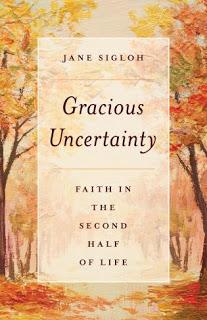
Published 15 August 2017.
Jane Sigloh, a retired Episcopal priest, has published Gracious Uncertainty: Faith in the Second Half of Life (2017).Because I am scheduled to teach Spirituality and Aging in the upcoming fall semester, I'm selecting 20 books on that topic so that each of my students can do a report to supplement the textbook.
Many of the books are tipped either to theology or to fold wisdom. However, too many of the books I've selected are steeped in theology (or even psychology or New Age theories).
Sigloh's book leans more towards the folk wisdom side of the spectrum. However, it's clear that she is well read and can take a more academic approach. She often chooses to be more accessible, and it's a strength.
Her chapters are brief, maybe three or four pages long, making them ideal as daily meditations. They might also serve as prompts for writing in a journal.
The chapters usually start with a reference to popular cultures--a song quote or a film reference. Or she might talk about a personal experience that readers will find relatable.
For example, in the chapter "A Lot of Unlearning," Sigloh starts with a references to billboards she saw as a child. She then deepens that to discuss the tension between being saved by works and being saved by grace. She quotes from Timothy and C.S. Lewis. She also describes her moral and physical weaknesses before wondering:
"Maybe there's a message in my weakness. Maybe it's a good thing to unlearn that sense of self-sufficiency" (92).To illustrate her ability to draw on other written works, see her chapter "To Clap or Not to Clap" she describes the scene in Peter Pan where readers/viewers are asked to invigorate Tinkerbell by clapping.
Sigloh then writes about the relationship between prayer, faith, and miracles. She weaves in her own experience with references to Huckleberry Finn, Eli Weisel, and C.S. Lewis, and St. Thomas Aquinas.
I look forward to seeing what my twentysomething students have to say about this book and how it addresses age-related issues of retirement, disability, grief, and death. But I also see how the book has universal appeal for its discussions of faith, humility, wisdom, patience, and compassion.
Sigloh has written a gentle, lyric book that invites readers to deepen their understanding of everyday challenges.
Related:
Books on Aging and Spiritual Growth

